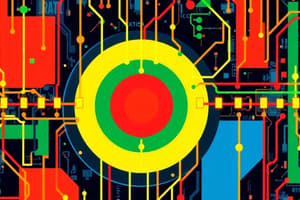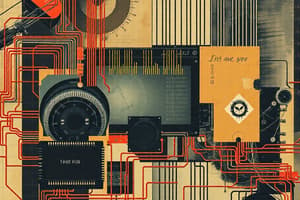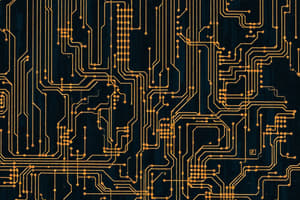Podcast
Questions and Answers
What is a key advantage of digital circuits over analog circuits?
What is a key advantage of digital circuits over analog circuits?
- Ease of implementation (correct)
- Lower precision
- Inability to integrate new technologies
- Higher power consumption
Why are digital circuits beneficial for battery-operated devices like smartphones?
Why are digital circuits beneficial for battery-operated devices like smartphones?
- They consume more power
- They have lower precision
- They consume less power (correct)
- They are difficult to implement
What role does digital electronics play in modern technology?
What role does digital electronics play in modern technology?
- It is only used in communication networks
- It is primarily used in older devices
- It is crucial for various applications (correct)
- It is irrelevant in modern technology
How does digital electronics contribute to innovation in products?
How does digital electronics contribute to innovation in products?
Why are digital circuits more affordable compared to analog circuits?
Why are digital circuits more affordable compared to analog circuits?
What is the main function of logic gates in digital electronic circuits?
What is the main function of logic gates in digital electronic circuits?
Which component plays a vital role in memory storage and processing in digital systems?
Which component plays a vital role in memory storage and processing in digital systems?
What is the primary function of registers in digital electronics?
What is the primary function of registers in digital electronics?
How do counters function in digital circuits?
How do counters function in digital circuits?
What is the primary purpose of decoders in digital circuits?
What is the primary purpose of decoders in digital circuits?
Flashcards are hidden until you start studying
Study Notes
Understanding Digital Electronics
Digital electronics refers to the branch of electrical engineering that deals with the study, research, design, development, and implementation of electronic devices, circuits, and communication systems using binary digits (bits) to process information. This discipline plays a crucial role in modern technology, from computers and smartphones to communication networks and advanced automation systems. In this article, we will discuss key aspects of digital electronics, including its importance, components, and applications.
Importance of Digital Electronics
Digital electronics is essential due to several reasons:
- High precision: Digital circuits operate with high accuracy, making them suitable for precise measurement and control applications.
- Low power consumption: Unlike analog circuits, digital circuits consume less power, which is beneficial for battery-operated devices such as smartphones and laptops.
- Ease of implementation: Digital circuits can be easily designed and manufactured using integrated circuit technology, making them more accessible and affordable for various applications.
- Flexibility and scalability: Digital electronics allows for easy integration of new features and technologies through software updates or hardware modifications, enabling faster innovation and product improvement cycles.
Digital Electronics Components
Several components are crucial to the operation of digital electronic systems:
Logic Gates
Logic gates are basic building blocks of digital electronic circuits. They perform Boolean operations, such as AND, OR, NOT, etc., on binary inputs and generate binary outputs based on predefined logic rules. Some common logic gates include:
- AND gate: Output is true only when all inputs are true.
- OR gate: Output is true if any input is true.
- NOT gate: Output is the opposite of the given input.
Combining these gates in various configurations enables the development of complex digital circuits for diverse functions.
Flip-Flops
Flip-flops are sequential digital circuits that store and manipulate data over time. They have two stable states called SET and RESET. Flip-flops play a vital role in memory storage and processing.
Registers
Registers are groups of flip-flops used to temporarily store data during computations. They serve as intermediate storage locations within digital electronic systems.
Counters
Counters are sequential circuits that count from zero to a maximum value and then reset back to zero. They can be implemented using flip-flops and combinatorial logic elements.
Decoders
Decoders are digital circuits that convert one code into multiple output signals. For example, a 3-to-8 decoder converts a 3-bit binary code into eight separate output lines.
Applications of Digital Electronics
Digital electronics has numerous applications across various fields:
Computers and Mobile Devices
From processors and memories to input/output devices and communication interfaces, digital electronics plays a central role in computers and mobile devices' functionality.
Communication Systems
Digital electronics is fundamental to modern communication networks like cellular phone systems, satellite communications, and Internet infrastructure. It ensures efficient transmission, reception, and processing of digital information.
Medical Equipment
Advanced medical equipment, such as diagnostic imaging machines and monitoring systems, rely heavily on digital electronics for precision and accuracy.
Industrial Automation
Smart manufacturing processes and automated control systems employ digital electronics to regulate production line efficiency, quality control, and error detection.
The field of digital electronics continues to evolve, driving innovations in computing, communication, and other technological advancements. Understanding its principles and applications is essential for navigating our increasingly digitized world.
Studying That Suits You
Use AI to generate personalized quizzes and flashcards to suit your learning preferences.




